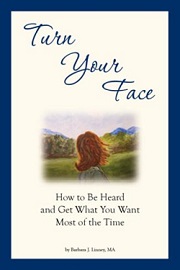What We're Reading Now
Practice Compassion Through Freewriting
24 March 2017
Eden read Turn Your Face: How to Be Heard and Get What You Want Most of the Time by Barbara Linney and learned how freewriting can be a great way to practice self-compassion.
Tags: balance, barbara linney, compassion, eden read, freewriting, self-compassion, turn your face
I’ve been thinking a lot about self-compassion lately—partly because I’ve been reading Brené Brown and partly because the first three months of the year have left me feeling a little bit tired. When I say tired I don’t mean sleep-deprived. I mean the type of mental and emotional exhaustion that leaves you feeling like you have nothing to say when someone asks how you are so you end up saying, “I’m just a little bit tired.” It’s code for, “I’m not doing great, but I don’t want to talk about it.” Chances are you’ve encountered someone this week who was feeling “tired” or maybe that person was you. For the past several weeks, I’ve felt like that person was me.
It’s been a good reminder that there’s a big difference between knowing how to talk about self-compassion and practicing it. One thing I’ve learned that often stops us from doing the things that might help us feel better is the judgment we place on ourselves about what we should be feeling or doing. This is particularly true for me when it comes to writing. That’s why the advice in Barbara Linney’s book, Turn Your Face: How to Be Heard and Get What You Want Most of the Time, has been a great resource for me this year. In chapter one I learned about freewriting, which is the process of “writing without stopping for ten minutes while not worrying about spelling, punctuation, grammar or content.”

You see, writing is one of the tools I often use to help me sort out my thoughts and feelings, but I’ve always viewed writing as the product of inspiration, motivation, and creativity. Mustering all of those things on a daily basis is a tall order. Freewriting, on the other hand, is a very different process. Barbara describes it as, “the bucket for dropping into the well.” Rather than writing to create something, freewriting is writing to capture what is already there. This means that if the only thing you can think to say is “I have nothing to say” then that’s okay and you can write that sentence down as long as it is true. I’ve found that freewriting is more helpful to me than trying to explain exactly what’s going on and getting frustrated when I can’t find the right words.
If you’d like to try freewriting, you can read more about it in this blog post or the first chapter of Barbara’s book. I’ve found that allowing yourself to write without passing judgment is a good first step at practicing self-compassion. If you’ve been feeling tired, it might be just the thing you need.







Comments
Our Comment Policy:
Our blog posts are only half of the conversation. What our readers have to say is equally important to us, and we're grateful for all the comments that continue the dialog.
To ensure that the discussion here is as useful as possible to all of our readers, please be respectful of our contributors and refrain from harassing, threatening and/or vulgar language. We reserve the right to screen and remove any comments from the site. If you have a question about a comment or want to discuss our policy, please contact us. We'll talk it over.
There are no comments for this entry yet.